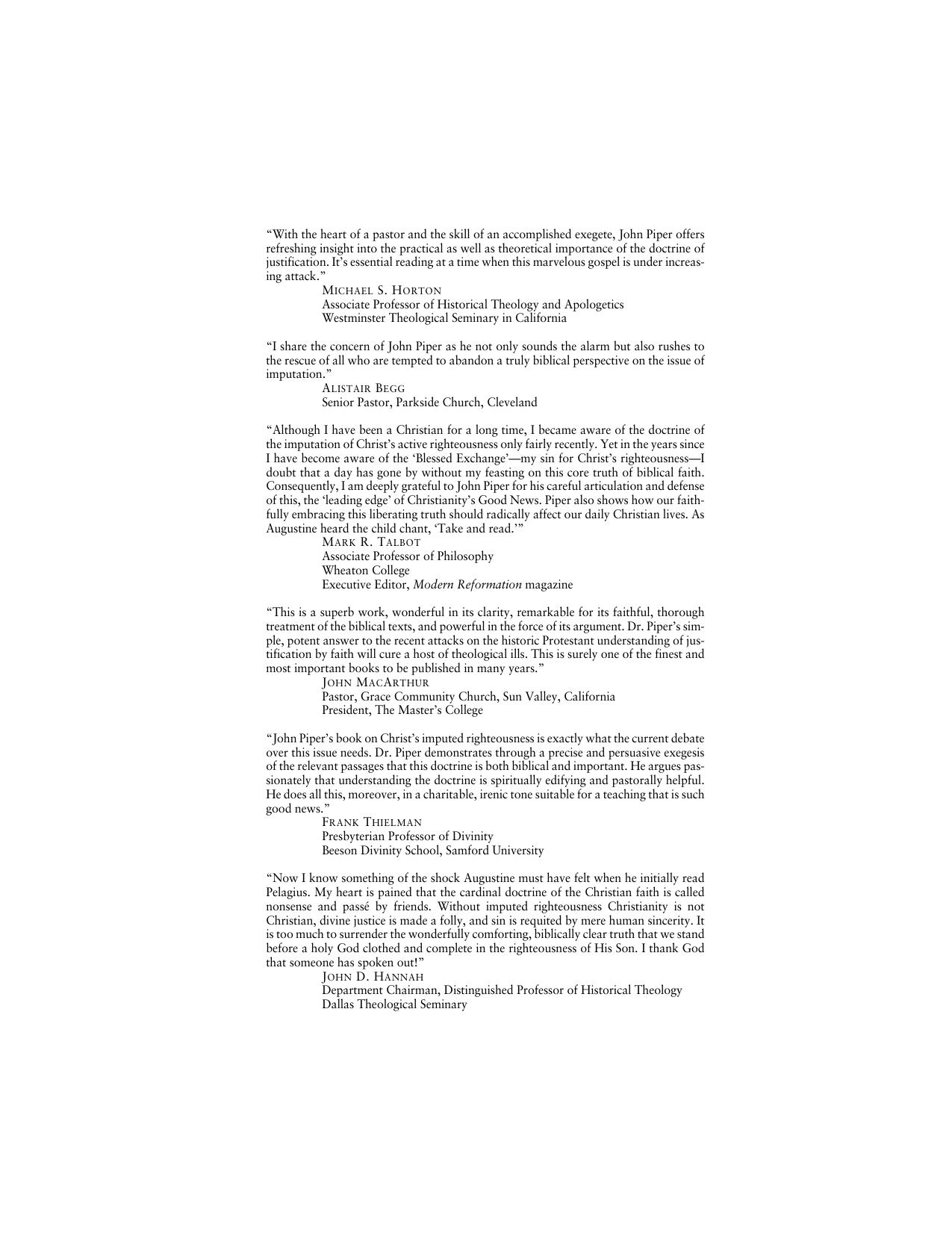Counted Righteous in Christ: Should We Abandon the Imputation of Christ's Righteousness? by John Piper

Author:John Piper
Language: eng
Format: mobi, epub, pdf
Tags: Religion
ISBN: 9781581344479
Publisher: Crossway
Published: 2002-11-14T22:00:00+00:00
“even over those whose sinning was not like the transgression of Adam.” If this is the case, there would have to be a way to account for why Romans 1:32 does not contradict it. There Paul says that these Gentiles “know God’s decree (to; dikaivwma, to dikaiøma), that those who practice such things deserve to die (a[xioi qanavtou eijsivn ( axioi thanatou eisin). So it seems that there is some kind of “death sentence” that they are aware of. But I admit that Paul may have thought about these people in a way that I do not yet understand.
44 Gundry has a very different way of construing Romans 5:12-14. He argues that “‘all have sinned’ in Romans 5:12 does not mean God imputed Adam’s original sin to the rest of the human race” (I, 8). Concerning the people who committed their sins “before the law was given,” and “not after the likeness of Adam’s transgression,” he says that the way their sin-An Exegetical Response to the Challenge
101
§ 4 . 5 . 2 . 2 W h y D i d P a u l I n t r o d u c e t h e A d a m - C h r i s t C o n n e c t i o n a t T h i s P l a c e ?
Now here is the all-important question: Why did Paul exactly at this place—at the end of verse 14, right after saying that death came to those who did not sin personally against an explicit law with a death penalty the way Adam did—why exactly here did Paul insert the all-important words, “who was a type of him who was to come”? Why, precisely at this point, did Paul say that Adam is a type of Christ?
He says that Adam is a type or pattern45 of Christ because the all-important parallel is seen here. The parallel here is this: The judicial consequences of Adam’s sin are experienced by all his people not on the basis of their doing sins like he did, but on the basis of their being in him and his sin being imputed to them. As soon as that becomes clear in Paul’s argument—just at this point—he brings in Christ as the parallel. The point is to make clear what the focus of the parallel is: The judicial consequences of Christ’s righteousness are experienced by all his people not on the basis of their doing righteous deeds like he did, but on the ning was distinct from Adam’s original sin is that “they did not consist of transgressions, which could be entered as debits on an account, but consisted of slave-service to sin as a dominating force” (I, 8). This strikes me as foreign to the flow of thought and the context. Paul will have much to say about slavery to sin in chapter 6, but to see this here seems unwarranted.
Moreover, it does not seem to fit the thought of verse 14.
Download
Counted Righteous in Christ: Should We Abandon the Imputation of Christ's Righteousness? by John Piper.epub
Counted Righteous in Christ: Should We Abandon the Imputation of Christ's Righteousness? by John Piper.pdf
This site does not store any files on its server. We only index and link to content provided by other sites. Please contact the content providers to delete copyright contents if any and email us, we'll remove relevant links or contents immediately.
The Secret Power of Speaking God's Word by Joyce Meyer(3182)
Signature in the Cell: DNA and the Evidence for Intelligent Design by Stephen C. Meyer(3132)
Real Sex by Lauren F. Winner(3014)
The Holy Spirit by Billy Graham(2944)
The Gnostic Gospels by Pagels Elaine(2527)
Jesus by Paul Johnson(2352)
Devil, The by Almond Philip C(2325)
23:27 by H. L. Roberts(2248)
The Nativity by Geza Vermes(2227)
Chosen by God by R. C. Sproul(2161)
All Things New by John Eldredge(2160)
Angels of God: The Bible, the Church and the Heavenly Hosts by Mike Aquilina(1957)
The Return of the Gods by Erich von Daniken(1943)
Angels by Billy Graham(1922)
Knowing God by J.I. Packer(1854)
Jesus of Nazareth by Joseph Ratzinger(1811)
The Gnostic Gospel of St. Thomas by Tau Malachi(1793)
Evidence of the Afterlife by Jeffrey Long(1786)
How To Be Born Again by Billy Graham(1778)
